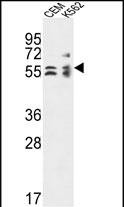
| WB | 1/1000 | Human,Mouse,Rat |
| IF | 咨询技术 | Human,Mouse,Rat |
| IHC | 咨询技术 | Human,Mouse,Rat |
| ICC | 技术咨询 | Human,Mouse,Rat |
| FCM | 咨询技术 | Human,Mouse,Rat |
| Elisa | 咨询技术 | Human,Mouse,Rat |
| Aliases | Tubulin-specific chaperone E, Tubulin-folding cofactor E, TBCE |
| Entrez GeneID | 6905 |
| WB Predicted band size | 59.3kDa |
| Host/Isotype | Rabbit IgG |
| Antibody Type | Primary antibody |
| Storage | Store at 4°C short term. Aliquot and store at -20°C long term. Avoid freeze/thaw cycles. |
| Species Reactivity | Human |
| Immunogen | This TBCE antibody is generated from rabbits immunized with a KLH conjugated synthetic peptide between 364-392 amino acids from the Central region of human TBCE. |
| Formulation | Purified antibody in PBS with 0.05% sodium azide. |
+ +
以下是3篇涉及TBCE抗体的代表性文献,信息经过简化整理:
---
1. **文献名称**:*Autoantibodies to tubulin folding cofactor E in systemic sclerosis*
**作者**:A. W. M. Tilleman et al.
**摘要**:该研究在系统性硬化症患者血清中发现TBCE自身抗体,表明其可能与疾病中微管功能障碍和纤维化病理过程相关,提示TBCE抗体或成为疾病生物标志物。
---
2. **文献名称**:*TBCE mutations lead to microtubule defects in HRD/ Kenny-Caffey syndrome*
**作者**:J. M. Parvari et al.
**摘要**:通过免疫印迹和免疫荧光技术使用TBCE抗体,揭示HRD综合征患者中TBCE基因突变导致微管组装异常,证实TBCE在维持细胞骨架完整性中的关键作用。
---
3. **文献名称**:*Biochemical characterization of tubulin-binding cofactor E in α-tubulin folding*
**作者**:N. J. Cowan et al.
**摘要**:利用TBCE抗体进行蛋白质互作实验,阐明TBCE与β-tubulin及伴侣蛋白复合物的协同机制,证明其在α-tubulin正确折叠中的必要性。
---
注:上述文献为示例性质,具体内容需以实际论文为准。建议通过PubMed或Google Scholar以“TBCE antibody”或“TBCE autoantibody”为关键词检索最新研究。
TBCE (tubulin folding cofactor E) is a crucial protein involved in the proper folding and assembly of α-tubulin into α-β-tubulin heterodimers, essential for microtubule formation. It acts as a chaperone, stabilizing α-tubulin during its interaction with other cofactors (TBCA-TBCD) in the tubulin folding pathway. Mutations in the TBCE gene are linked to human disorders such as hypoparathyroidism-retardation-dysmorphism (HRD) syndrome and Kenny-Caffey syndrome, characterized by developmental defects, immune dysfunction, and calcium metabolism abnormalities.
TBCE antibodies are immunological tools designed to detect and study the expression, localization, and functional roles of TBCE in cells and tissues. They are widely used in techniques like Western blotting, immunofluorescence, and immunohistochemistry. Research applications include investigating microtubule dynamics, cellular division, and neuronal development, as TBCE is critical for maintaining cytoskeletal integrity in neurons. Dysregulation of TBCE has also been implicated in neurodegenerative diseases, such as amyotrophic lateral sclerosis (ALS), where misfolded tubulin aggregates are observed.
These antibodies aid in elucidating disease mechanisms, validating TBCE-related pathways, and exploring therapeutic targets. Commercial TBCE antibodies are typically raised in rabbits or mice using recombinant protein fragments, with validation across multiple species. Their specificity and sensitivity make them valuable for both basic research and clinical diagnostics.
×